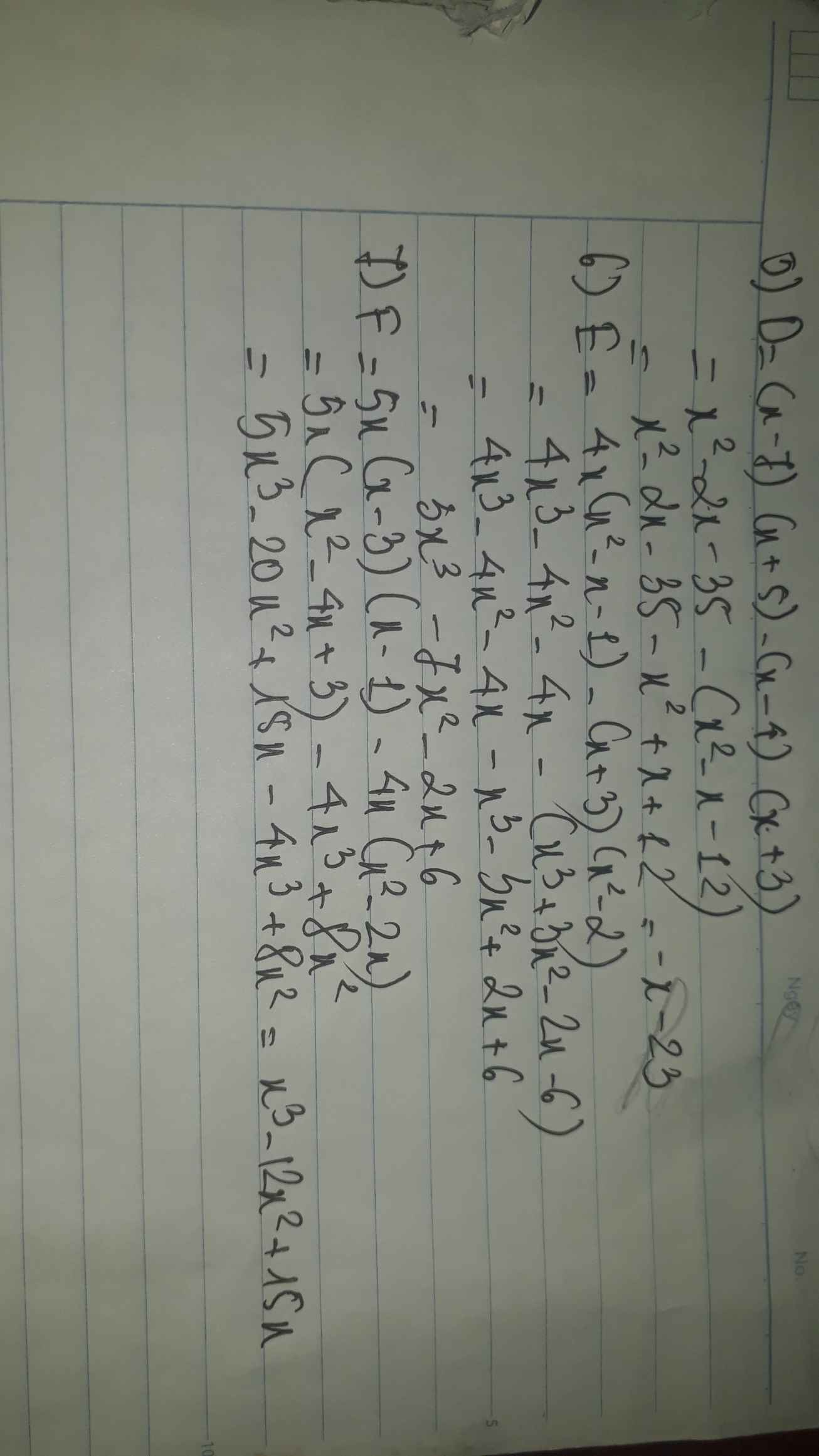
Hãy nhập câu hỏi của bạn vào đây, nếu là tài khoản VIP, bạn sẽ được ưu tiên trả lời.


\(A=x^2+4x-21-x^2-4x+5=-16\\ B=-2\left(4x^2+20x+25\right)-\left(1-16x^2\right)\\ B=-8x^2-40x-50-1+16x^2=8x^2-40x-51\\ C=x^2\left(x^2-16\right)-\left(x^4-1\right)=x^4-16x^2-x^4+1=1-16x^2\\ D=x^3+1-\left(x^3-1\right)=2\\ E=x^3-3x^2+3x-1-x^3+1-9x^2+1=-12x^2+3x+1\)

a) x = -1. b) x = 4 hoặc x = 5.
c) x = ± 2 . d) x = 1 hoặc x = 2.

Ta có :
\(x^2-4x+5=\left(x^2-2.2x+2^2\right)+1=\left(x-2\right)^2+1\ge1>0\)
Vậy đa thức \(x^2-4x+5\) vô nghiệm với mọi giá trị của x
Chúc bạn học tốt ~

\(a,\Rightarrow\left(2x-5\right)^2+2\left(2x-5\right)\left(x+2\right)+\left(x+2\right)^2=0\\ \Rightarrow\left(2x-5+x+2\right)^2=0\\ \Rightarrow3x-3=0\\ \Rightarrow x=1\\ b,\Rightarrow9-\left(x^2-5x\right)^2=9\\ \Rightarrow x^2-5x=0\\ \Rightarrow x\left(x-5\right)=0\Rightarrow\left[{}\begin{matrix}x=0\\x=5\end{matrix}\right.\)

Bài 1:
a) (3x - 2)(4x + 5) = 0
<=> 3x - 2 = 0 hoặc 4x + 5 = 0
<=> 3x = 2 hoặc 4x = -5
<=> x = 2/3 hoặc x = -5/4
b) (2,3x - 6,9)(0,1x + 2) = 0
<=> 2,3x - 6,9 = 0 hoặc 0,1x + 2 = 0
<=> 2,3x = 6,9 hoặc 0,1x = -2
<=> x = 3 hoặc x = -20
c) (4x + 2)(x^2 + 1) = 0
<=> 4x + 2 = 0 hoặc x^2 + 1 # 0
<=> 4x = -2
<=> x = -2/4 = -1/2
d) (2x + 7)(x - 5)(5x + 1) = 0
<=> 2x + 7 = 0 hoặc x - 5 = 0 hoặc 5x + 1 = 0
<=> 2x = -7 hoặc x = 5 hoặc 5x = -1
<=> x = -7/2 hoặc x = 5 hoặc x = -1/5

1) \(\left(\dfrac{1}{2}x+3\right)\left(x^2-4x-6\right)\)
\(=\dfrac{1}{2}x^3-2x^2-3x+3x^2-12x-18\)
\(=\dfrac{1}{2}x^3+x^2-15x-18\)
2) \(\left(6x^2-9x+15\right)\left(\dfrac{2}{3}x+1\right)\)
\(=4x^3+6x^2-6x^2-9x+10x+15\)
\(=4x^3+x+15\)
3) Ta có: \(\left(3x^2-x+5\right)\left(x^3+5x-1\right)\)
\(=3x^5+15x^2-3x^2-x^4-5x^2+x+5x^3+25x-5\)
\(=3x^5-x^4+5x^3+10x^2+26x-5\)
4) Ta có: \(\left(x-1\right)\left(x+1\right)\left(x-2\right)\)
\(=\left(x^2-1\right)\left(x-2\right)\)
\(=x^3-2x^2-x+2\)

\(a,4x^2-4y^2-20x+20y=4\left(x^2-y^2\right)-\left(20x-20y\right)=4\left(x-y\right)\left(x+y\right)-20\left(x-y\right)=\left(x-y\right)\left(4x+4y-20\right)=4\left(x-y\right)\left(x+y-5\right)\\ b,16x^2-25+\left(4x-5\right)=\left(4x-5\right)\left(4x+5\right)+\left(4x-5\right)=\left(4x-5\right)\left(4x+5+1\right)=\left(4x-5\right)\left(4x+6\right)=2\left(4x-5\right)\left(2x+3\right)\)
\(c,\left(x+5y\right)^3=x^3+15x^2y+75xy^2+125y^3\\ e,x^2-4x+4-y^2=\left(x-2\right)^2-y^2=\left(x-y-2\right)\left(x+y-2\right)\\ g,x^2-3x-4=\left(x^2-4x\right)+\left(x-4\right)=x\left(x-4\right)+\left(x-4\right)=\left(x+1\right)\left(x-4\right)\)

4:
\(P=\left(x+4\right)\left(x^2-4x+16\right)-\left(64-x^3\right)\)
\(=x^3+64-64+x^3=2x^3\)
Khi x=-20 thì \(P=2\cdot\left(-20\right)^3=-16000\)
=>Chọn C
2: Đề khó hiểu quá bạn ơi

\(\Leftrightarrow x^3+4x^2+5x-x^3-4x^2=0\)
\(\Leftrightarrow5x=0\)
\(\Leftrightarrow x=0\)
vậy pt có tập nghiệm S={0}